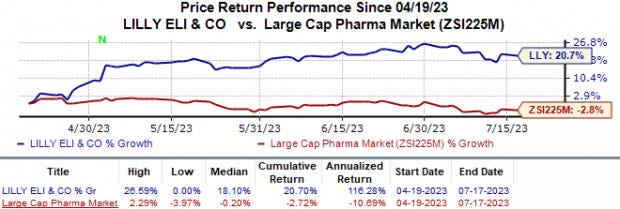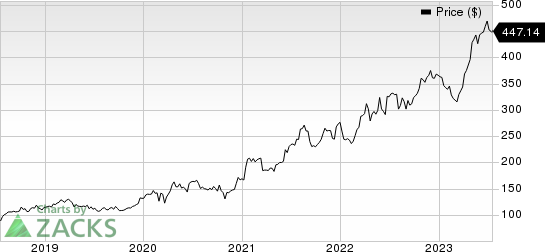Lilly's (LLY) Donanemab Slows Alzheimer's Disease Progression
Eli Lilly LLY reported full results from the phase III TRAILBLAZER-ALZ 2 study, which evaluated donanemab, its Alzheimer’s Disease (“AD”) candidate. These results were presented at the 2023 Alzheimer's Association International Conference (AAIC) and also simultaneously published in the Journal of the American Medical Association (JAMA).
Upon full analysis of data, the results confirmed that treatment with donanemab significantly slowed cognitive and functional decline in patients with early symptomatic AD (either mild cognitive impairment or mild dementia due to AD), thereby lowering the risk of disease progression. Overall, those treated with donanemab significantly slowed decline by 22% on the integrated Alzheimer's Disease Rating Scale (“iADRS”) scale and 29% on the Clinical Dementia Rating-Sum of Boxes (“CDR-SB”) scale.
The iADRS scale measures cognition and activities of daily living such as managing finances, driving, engaging in hobbies and conversing about current events. The CDR-SB scale is a key measure of disease severity.
In fact, the study showed greater benefit of donanemab in patients at the earliest stage of AD. Around 47% of the study participants at the earlier stage of disease treated with donanemab had no clinical progression at 1 year (defined as no decline in CDR-SB) compared with 29% on placebo. Moreover, study participants with mild-cognitive impairment who were treated with donanemab exhibited slowed decline by 60% on iADRS and 46% on CDR-SB.
In addition, the treatment effect of donanemab continued to increase relative to placebo over the course of the study, despite many participants completing the study following six or 12 months of treatment, thereby supporting limited duration dosing of the drug.
The above results were also consistent with the positive data reported in May 2023, based on which, Lilly announced that the study had achieved its primary and secondary endpoints measuring cognitive and functional decline. The primary endpoint of the study was change from baseline until 18 months on the iADRS.
Shares of Eli Lilly have increased 20.7% so far this year against the industry’s 2.7% fall.

Image Source: Zacks Investment Research
Based on data from the TRAILBLAZER-ALZ 2 study, Lilly completed the resubmission of the biologics license application (“BLA”) with the FDA seeking approval for donanemab in AD indication during the second quarter. A final decision from the agency is expected before the year-end.
Earlier this January, the FDA issued a complete response letter to Lilly’s previously filed BLA seeking accelerated approval for donanemab to treat early symptomatic AD based on data from the phase II TRAILBLAZER-ALZ study. The agency rejected the BLA as it believed the accelerated approval submission included data for only a limited number of patients with 12-month drug exposure. The FDA asked Lilly to include data from at least 100 patients who received a minimum of 12 months of continued treatment with donanemab.
Like Lilly, several other pharma companies like Biogen BIIB, Prothena PRTA and Roche RHHBY have been engaged in developing their antibody candidates to treat AD.
Earlier this month, the FDA granted full approval to Biogen’s AD drug Leqembi (lecanemab). Following approval, the Biogen drug is the first and only approved anti-amyloid antibody treatment shown to reduce the rate of disease progression and slow cognitive impairment in the early and mild dementia stages of AD indication. Since Biogen’s Leqembi received full/standard approval from the FDA, it is also eligible for a broader Medicare coverage. Such coverage is crucial for a wider rollout of a treatment.
Prothena is evaluating multiple AD candidates in early-stage studies targeting AD indication. Prothena is evaluating PRX005, an investigational antibody that targets tau, a protein implicated in diseases — including AD, frontotemporal dementia, progressive supranuclear palsy, chronic traumatic encephalopathy and other tauopathies. Data from an early-stage study evaluating PRX005 is expected by the year end.
Prothena is evaluating another investigational high-potency monoclonal antibody PRX012, designed to target a key epitope at the N-terminus of Aβ for treating AD, in a phase I study. PRTA plans to initiate an IND filing for PRX123, a dual Aβ-Tau vaccine treatment and prevention therapy for AD by the end of this year.
Roche’s phase III GRADUATE I and II studies on a key Alzheimer’s pipeline candidate, gantenerumab failed to meet the primary endpoint of slowing clinical decline in people with early AD in November 2022. The level of beta-amyloid removal by Roche’s gantenerumab was less than expected. Roche developed the candidate in collaboration with MorphoSys.
Eli Lilly and Company Price

Eli Lilly and Company price | Eli Lilly and Company Quote
Zacks Rank & Stocks to Consider
Eli Lilly currently carries a Zacks Rank #3 (Hold). You can see the complete list of today’s Zacks #1 Rank (Strong Buy) stocks here.
Want the latest recommendations from Zacks Investment Research? Today, you can download 7 Best Stocks for the Next 30 Days. Click to get this free report
Biogen Inc. (BIIB) : Free Stock Analysis Report
Roche Holding AG (RHHBY) : Free Stock Analysis Report
Eli Lilly and Company (LLY) : Free Stock Analysis Report
Prothena Corporation plc (PRTA) : Free Stock Analysis Report
